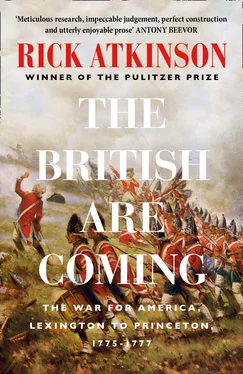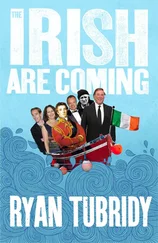Baffled by Virginians’ “blind and unreasoning fury,” Dunmore brooded in his palace. He peppered London with complaints and with unreliable appraisals of colonial politics, receiving little guidance in return. In April 1775, even before learning of events in Lexington and Concord, he ordered a marine detachment to confiscate gunpowder from the public magazine in Williamsburg on grounds that “the Negroes might have seized upon it.” Rebel drums beat and militia “shirtmen”—so named for their distinctive hunting garb—threatened “to seize upon or massacre me,” he told Whitehall. After reimbursing the rebels £330 for the powder he had impounded, in early June he fled with his family in the dark of night for refuge first aboard the Magdalen , then on the Fowey , and eventually on the Eilbeck , an unrigged merchant tub he renamed for himself. With his wife and children dispatched to Britain, Dunmore’s dominion was reduced to a gaggle of loyalist merchants, clerks, and scrofulous sailors. Still, with just a few hundred more troops, he wrote London in August, “I could reduce the colony to submission.”
The Gazette would accuse him of “crimes that would even have disgraced the noted pirate Blackbeard.” Most of his felonies involved what were derided as “chicken-stealing expeditions” against coastal plantations, although he also impounded a Norfolk printing press from a seditious publisher who dared suggest that Catholic blood ran through Dunmore’s veins.
But then the earl decided to become an emancipator.
Roughly five hundred thousand Americans were black, some 20 percent of the population, and nine in ten of those blacks were slaves. In southern colonies, the proportion of blacks to whites was much higher: 40 percent of Virginia’s half million people were of African descent—often from cultures with military traditions—and white fear of slave revolts was a prominent reason for keeping colonial militias in fighting trim. Many white masters were reluctant to allow missionaries to convert their chattel for fear that radical Christian notions would make them even less docile. Political turmoil in America gave some slaves hope, and for months runaway blacks had sought protection from the regulars in a belief that British views on slavery differed markedly from those of southern planters.
In truth, although slavery had begun to disappear in England and Wales, Britain’s colonial economy was built on a scaffold of bondage. Among many examples, the almost two hundred thousand slaves in Jamaica outnumbered whites fifteen to one, and an uprising in 1760 had been suppressed by shooting several hundred blacks. The slave trade, carried largely in British ships, had never been more prosperous than in the years just before the American rebellion, and Britain would remain the world’s foremost slave-trading nation into the nineteenth century.
Dunmore’s initial muttering to London in the early summer about emancipation was largely a bluff. He recognized that bound labor was critical to the white commonwealth he governed. The king’s government was unenthusiastic about wrecking colonial economies or encouraging slave revolts that might infect the West Indies. But by mid-fall Dunmore was desperate to regain the initiative in Virginia. Reinforced with a few dozen 14th Foot soldiers who’d arrived from St. Augustine, he launched several aggressive Tidewater raids, capturing or destroying seventy-seven rebel guns “without the smallest opposition,” as a British captain wrote General Howe on November 1, “which is proof that it would not require a very large force to subdue this colony.” Raising the king’s standard—unable to find British national colors, Dunmore settled for a regimental banner—he administered loyalty oaths to those who pinned on strips of red cloth as a badge of “true allegiance to his sacred Majesty George III.” The price of red fabric rose in Norfolk stores, reflecting demand.
On November 7, using his confiscated printing press, Dunmore declared martial law and issued a proclamation: “I do hereby further declare all indented servants, Negroes, or others (appertaining to rebels) free, that are able and willing to bear arms, they joining His Majesty’s troops as soon as may be.” Liberation applied only to the able-bodied slaves of his foes. There would be no deliverance for his own fifty-seven slaves—abandoned in Williamsburg when he fled and for whom he would claim compensation from the government—nor would loyalists’ chattel be freed. The governor intended to crush a rebellion, not reconfigure the social order.
Still, eager blacks found their way into his ranks. Fitted by the British with linen or sail-canvas shirts, often with the motto “LIBERTY TO SLAVES” across their chests, runaways with names like Sampson, Pompey, and Glasgow were formed into an “Ethiopian Regiment,” under white officers. Maryland patriots tried to bar correspondence with Virginia in a futile effort to prevent news of Dunmore’s gambit from spreading north. A Philadelphian wrote, “The flame runs like wild fire through the slaves.” British sailors in cutters raided riverside plantations in “Negro-catching” forays. On November 14, Dunmore personally led a detachment of Ethiopians, regulars, marines, and twenty Scottish clerks in a rout of Virginia shirtmen at Kemp’s Landing, southeast of Norfolk. The Americans loosed a volley or two before fleeing, their leaders reportedly “whipping up their horses” except for those too drunk to ride.
The small victory was good for recruiting both white loyalists—Dunmore boasted that three thousand men had joined him—and black runaways, who, he reported, “are flocking in.” The governor triumphantly marched into Norfolk on November 23. Many Tidewater loyalists publicly revealed their sympathies, and some avowed patriots retreated to the safer ground of neutrality. “This pink-cheeked time-server,” as the historian Simon Schama called Dunmore, “had become the patriarch of a great black exodus.” Thomas Jefferson would later claim that from Virginia alone tens of thousands of slaves escaped servitude during the war, a number likely inflated but suggestive of white anxiety.
“With our little corps I think we have done wonders,” Dunmore wrote Howe on November 30. “Had I but a few more men here, I would immediately march to Williamsburg … by which I should soon compel the whole colony to submit.” Norfolk possessed a fine harbor that “could supply your army and navy with every necessary of life,” if properly protected. His senior naval officer added in a dispatch from the Otter on December 2 that the Americans, “from their being such cowards and cold weather coming on,” were expected to remain quiet through the winter.
That was unlikely. Dunmore had miscalculated: rather than cowing white southerners and pressuring slave owners to remain loyal, he would unify Virginians as never before. An American letter written on December 6 and subsequently published in a London newspaper captured the prevailing sentiment: “Hell itself could not have vomited anything more black than his design of emancipating our slaves.”
The proclamation backfired throughout the South, even though many runaways from Georgia to Mount Vernon eventually made their way to coastal waters wherever British men-of-war appeared. Rumors spread that slaves who murdered their masters would be entitled to their estates. The lawyer Patrick Henry, whose recent demand “Give me liberty or give me death” clearly did not countenance “black banditti,” circulated copies of Dunmore’s announcement in order to inflame white slave owners. For many, a war about political rights now became an existential struggle to prevent the social fabric from unraveling. Even Piedmont yeomen whose slave holdings were limited to renting a field hand or two took offense. Edward Rutledge, a prominent South Carolina politician, wrote in December that arming freed slaves tended “more effectually to work an eternal separation between Great Britain and the colonies than any other expedient which could possibly have been thought of.”
Читать дальше












